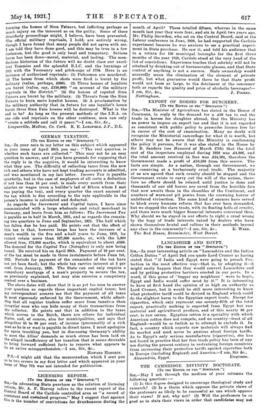GERMAN TAXATION.
(To TEE EDITOR or THE " SPwrnort."1 Sta,—In your note to my letter on this subject which appeared in your issue of April 30th you say: " The real question is whether such taxes are collected." This may not be an easy question to answer, and if you have grounds for supposing that the reply is in the negative, it would be interesting to know what they are. The difficulty of collecting taxes from the new rich and others who have not kept trading accounts is admitted, and was mentioned in my last letter. Income Tax is payable quarterly, but in the case of employees of all sorts a deduction of not less than 10 per cent. is made every month from their salaries or wages (even a builder's lad of fifteen whom I met was paying the tax), and every quarter the exact amount of the tax which is due according to the rate applicable to the person's income is calculated and deducted.
As regards the Increment and Capital taxes, I have since communicated with a large wholesale and retail merchant in Germany, and learn from him as follows : The Increment Tax is payable as to half in March, 1921, and as regards the remain- ing two quarters in June and September, 192L The half which has fallen due he has paid. He points out that the effect of this tax is that, however large has been the increase of a man's wealth in the five and a-half years to June, 1919, he cannot retain - more than 167,000 marks, or, with the 5,000 allowed free, 172,000 marks, which is equivalent to about J3860. The demand for the Capital Tax (Notopfer) is only now being issued. 'He received his on April 30th. Payment of 10 per cent. of the tax must be made in three instalments before June 1st, 1922. Periods for payment of the remainder of the tax have not yet been fixed; but the whole tax carries interest at 5 per cent, from January, 1920. The State can not only require a compulsory mortgage of a man's property to secure the tax, as previously explained, but may also exercise a compulsory control over a business.
The above dates will show that it is as yet too soon to answer your question as regards these important capital taxes; but say correspondent assures me that the payment of all taxes is most rigorously enforced by the Government, while admit- ting that all regular traders suffer more from taxation than irregular ones who can hide many of their transactions from the collector. He points out that in addition to the taxes which accrue to the Reich, there are others for individual States, and, of course, also for municipalities, and says that altogether 85 to 90 per cent. of income (presumably of a rich man as he is or was) is payable in direct taxes. I must apologize for again troubling you, but in discussing Germany's ability to meet the Allies' demands so much stress has been laid on the alleged insufficiency of her taxation that is seems desirable to bring forward sufficient facts to remove what appears to be an entire misapprehension.—I am, Sir, &c..
HOWARD HODGKIN.
P.S.—I might add that the memorandum which I sent you ns to two errors in my first letter and which appeared in your issue of May 7th was not intended for publication.


































 Previous page
Previous page